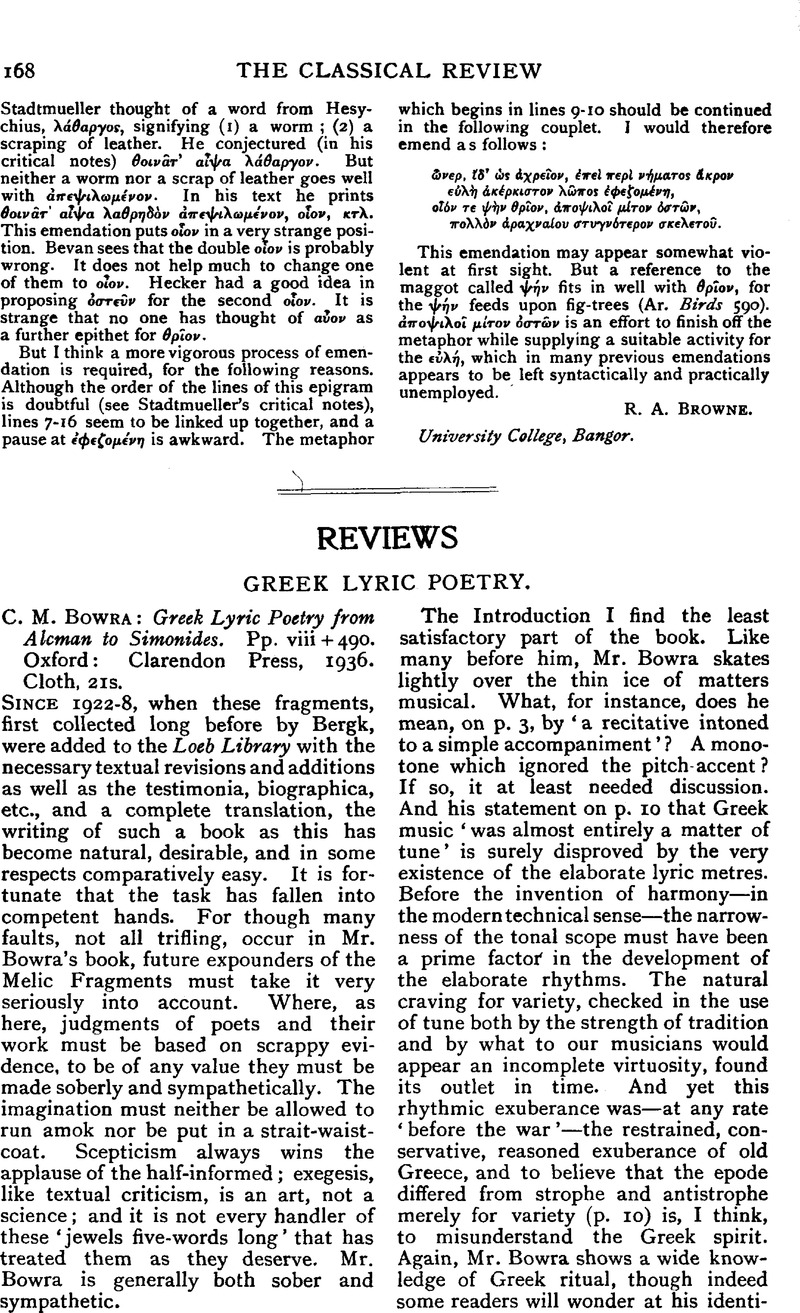No CrossRef data available.
Article contents
Greek Lyric Poetry - C. M. Bowra : Greek Lyric Poetry from Alcman to Simonides. Pp. viii + 490. Oxford: Clarendon Press, 1936. Cloth, 21s.
Published online by Cambridge University Press: 27 October 2009
Abstract

- Type
- Reviews
- Information
- Copyright
- Copyright © The Classical Association 1936
References
page 169 note 1 P. 11; see also the last sentence of the same page.
page 169 note 2 P. 12.
page 169 note 3 Eratosthenes ap. Sch. Pind. Ol. 9.
page 169 note 4 The theory involves change of speakers in the middle of a line, γὼν μν … γὼν δ, 11. 85–7, is the only really plausible argument in their favour, and it is by no means conclusive ; cf. Xen. An. 7. 7. 42 ![]() Soph. Phil. 63 πντα λεκ, πντα δ τολμητ, Eur. Med. 99 μτηρ κινεῖ κραδαν, κινεῖ δ χλον H.F. 65 ff. ἔχων … ἔχων δ … (Kühn.-Gerth ii. 2. 273), Hom. Od. 12. 189 ἴδμεν … ἴδμεν δ …, Hom. H. Dem. 229 οῖδα … οῖδα δ …
Soph. Phil. 63 πντα λεκ, πντα δ τολμητ, Eur. Med. 99 μτηρ κινεῖ κραδαν, κινεῖ δ χλον H.F. 65 ff. ἔχων … ἔχων δ … (Kühn.-Gerth ii. 2. 273), Hom. Od. 12. 189 ἴδμεν … ἴδμεν δ …, Hom. H. Dem. 229 οῖδα … οῖδα δ …
page 169 note 5 Similarly Ἁγησιχρα is surely a nickname.
page 169 note 6 Diehl, useful man, is only a compiler, and the emendations and supplements he prints are often ludicrous.
page 169 note 7 The ancient variant ρθαι read as Ὀᾳ is not necessarily unmetrical (p. 4 2) ; inscptions spell it -ια and -εα as well as -εια and -αια, and in any case both ει and αι would easily scan short before a vowel.
page 170 note 1 ![]() .
.
page 170 note 2 ![]() (Eustath. cit.
(Eustath. cit. ![]() .
.
page 170 note 3 The Partheneion was unlucky in being discovered as early as 1855, when, as indeed for long after, the importance of the accurate measurement of spaces was not recognized; and thus the guesses of the earlier editors have been too readily perpetuated. The same is, or rather was, true of the great Bacchylides Papyrus ; Jebb printed 160 supplements verifiable by measurement; of these 31 are demonstrably wrong and 11 doubtful.
page 170 note 4 Some of Mr. Bowra's translations I find remarkably familiar, e.g. a long passage about a donkey on p. 320; but I forgive him. I confess I feel rather less generous towards his statement on p. 448 that my supplement κα δαν, in Sappho's Nereid Ode, leaves the μδες of the next line ‘practically without meaning.’ It does, with Blass's egregious [μηκτι μ], but not with my [δσκλεα μ]δεις, i.e. δσκλεια taken as predicate with γνοιτο δ' ἄμμι. And, by the way, the new alternative to κα δαν is much too long. In his second edition Mr. Bowra will doubtless correct certain misaccentuations and one or two curious slips, e.g. γρυπς for γρπες on p. 51, κα for τα on p. 37, 1. 70, δι for σι on p. 24, and γρφη for γρῖφοι on p. 318, the first and last repeated in the Index; and Stesichorus must have called his poem Ἑλνα, not Ἑλνη.


